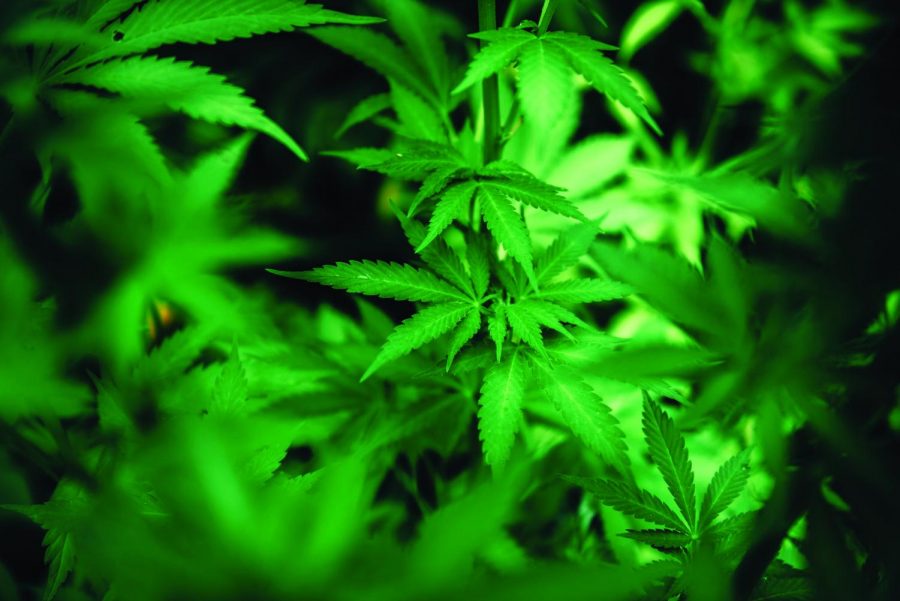Iowa’s marijuana laws are outdated
Opinion Columnist Emerson Slomka discusses Iowa’s marijuana legislation in comparison to Illinois’.
Oct 8, 2020
On Jan. 1 of this year, recreational marijuana use was legalized in my home state of Illinois. A record high of $68 million in profits last month were reached, and, depending on the product, the tax paid can be anywhere from 10% to 25%. These taxes go to various different funds, but collectively contribute to clearing records, providing drug treatments, supporting communities and supporting the end of the war on drugs.
Prior to the legalization of recreational marijuana, Illinois allowed for the legalized use of medical marijuana in controlled circumstances; products containing THC (the psychoactive substance that causes highs) required a referral from one’s doctor, but anyone over the age of 18 could purchase CBD (the component of cannabis with no psychoactive capabilities, but with stronger medicinal properties). Iowa, by comparison, has much more conservative laws surrounding marijuana. Recreational use is illegal; medical use is restricted to the point where it might as well be illegal. While laws surrounding CBD are admittedly confusing and unclear, it can be concluded that, in most cases, it’s illegal without doctors’ consent.
Leaving Illinois, a place with such a strong “cannabis culture,” and moving to a place where practically any use of the substance was illegal was admittedly a bit jarring. Back home, I know a multitude of people who legally used medical marijuana for both mental and physical ailments, and I myself relied on CBD products to relieve pain from my chronic migraines. The reality is, cannabis has been used recreationally and medicinally since its discovery, and its criminalization had nothing to do with health risks– rather, it was a blatant act of racism that can be predominantly linked to a blatantly racist individual named Harry Anslinger, the founding Commissioner of the Federal Bureau of Narcotics.
I’ll spare you the particularly heinous remarks he had made about non-white people during his reign, but in short, he believed the “horrors” of cannabis were used to fuel the fear of the “degeneracy” of Mexican immigrants during a time in which immigration was becoming increasingly common. Due to its accessibility in the southern States, cannabis became closely associated with early 20th century jazz culture (a predominantly Black culture) which, of course, Anslinger used to further the fear. Even to this day, in non-decriminalized states such as Iowa, jails and prisons are packed with nonviolent offenders for “crimes” that are completely legal across state lines. This only raises the question: why isn’t Iowa legalizing cannabis?
According to a Des Moines Register/Mediacom Iowa poll, a 53% majority of Iowans support legalizing recreational marijuana. Even more telling is the 81% of Iowans who support expanding access to medical marijuana– it’s obvious that Iowans are in support of change. The issue doesn’t seem to come down to Iowans, but rather, Iowa’s leadership. Governor Kim Reynolds is outspoken about her stance against cannabis use, and doesn’t seem to be in a persuadable position:
“I do not support recreational marijuana. I don’t. I won’t be the governor to do that… I just think that when the data continues to come in, especially with the strength that we’re seeing, the potency, the amount of psychotic episodes that are happening, it’s a gateway and there are statistics there to support that.”
While her stance on recreational marijuana use leaves a lot to be desired (and cites a lot of disproven science– most marijuana users don’t move onto “harder” drugs, a fact accepted by the CDC), her stance on medical marijuana is promising, at least:
“Medical is different. I think we need to be cautious and careful.”
However, as long as Reynolds continues to serve as governor, it’s unlikely that Iowa will see any sort of drug reform, no matter how long overdue it is. The resounding success of Illinois’ legalization should be a sign that Iowa needs to adapt to the changing world and that its leaders need to listen to its people.

















Thomas • Oct 10, 2020 at 2:51 pm
Kim Reynolds is a reasonable person and is respectful of the law. Indeed when conflict exists with federal law, it’s best to reconcile differences.
Is Iowa exempt from DEA law enforcement regarding the state’s cannabis rules? Does Iowa marijuana law guarantee protection from federal authorities enforcing the controlled substances act?